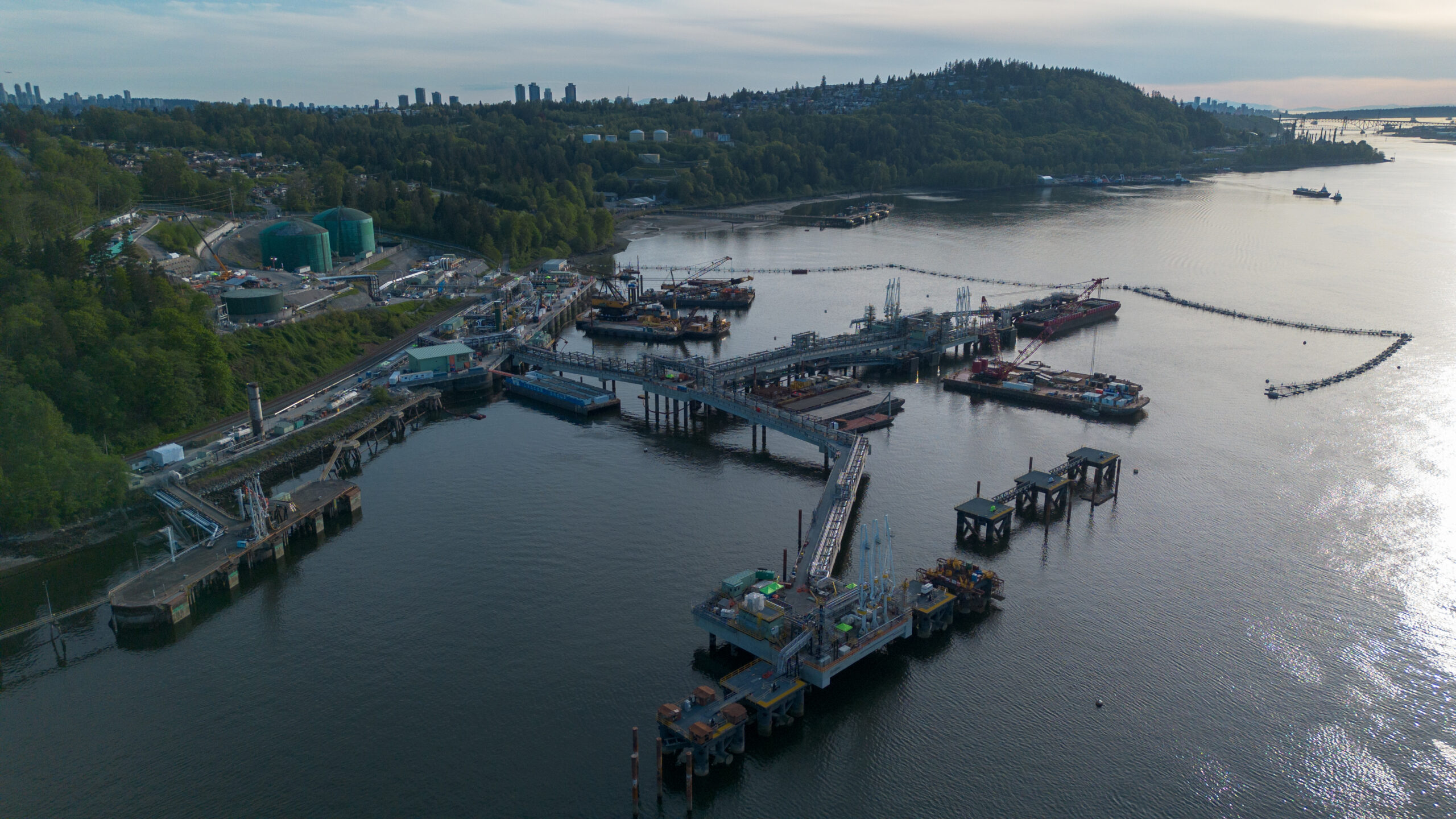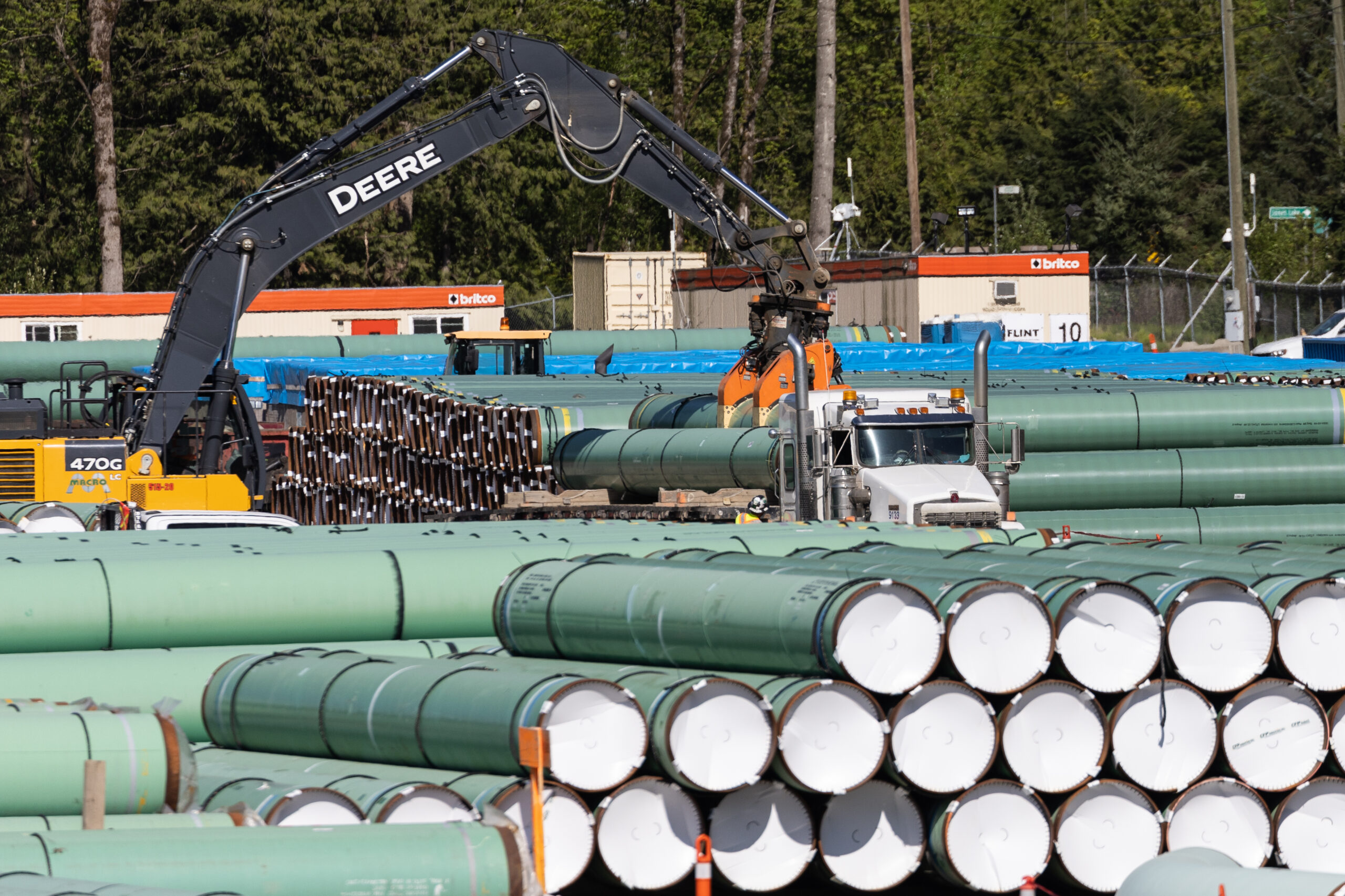
The federal government ‘sees a long-term future for the oilsands.’ Here’s what you need to know
An internal document obtained by The Narwhal shows how the natural resources minister was briefed...
Get the inside scoop on The Narwhal’s environment and climate reporting by signing up for our free newsletter.
The Trans Mountain fossil fuel pipeline expansion has not led to significantly lower prices at the pumps in Vancouver — but the economist who championed that theory is arguing a strict price comparison misses the bigger picture.
Kent Fellows, an assistant professor of economics at the University of Calgary, published a paper with the C.D. Howe Institute think tank this summer that argued the expansion of the government-owned Trans Mountain pipeline system meant “B.C. residents should see some gas-price relief.”
The federal government spent $34 billion twinning the pipeline, building new pump stations and upgrading a marine terminal. The result was to nearly triple the capacity of the existing system. which carries both crude oil from Alberta’s oilpatch and refined petroleum products like gasoline to refineries, oil tankers and storage hubs on the west coast.
The extra pipeline capacity, Fellows wrote in the paper, gave Vancouver easier access to cheaper fuel refined in Edmonton, considered the hub of gasoline production in western Canada, instead of having to rely on more expensive options carried by rail or imported from other countries.
The analysis made headlines, and a group that promotes Canadian oil and gas seized on it to argue that the “economic benefits” of local fossil fuel infrastructure means Canadians should support other new oil and gas projects such as pipelines and liquefied natural gas facilities.
Fellows, who is also the director of graduate programs for the university’s school of public policy, spoke to The Narwhal in late November. He acknowledged the latest data shows the average retail price of gasoline in Vancouver was not noticeably any cheaper that month than it was at the beginning of the year, before the Trans Mountain expansion went into service in May.
While retail prices in Vancouver have come down since the summer, a Narwhal review of the data shows this corresponded with the tail end of a seasonal price spike that began in March, peaked in April and stayed elevated until September, when it returned to about where it was in February.
And stripping out taxes and the margin tacked on by retailers shows the same conclusion: November’s average wholesale gasoline price for Vancouver was only a few cents off where it was in January.
Fellows, however, argued gas prices in Vancouver would hypothetically be even higher if the expanded pipeline hadn’t been built, due to inflationary pressures affecting the entire economy.
“It is a tough conversation to have with people, because you're right, the price is still high. So they're not happy about that, and fair enough, they shouldn't be,” Fellows said.
“The argument that I would make is, without the pipeline, the price is even higher than it is right now. … [While] it's really compelling to compare this year's price to last year's price and say, ‘Oh, well, it's not a whole lot lower, so the pipeline didn't do anything,’ what you need to be doing is comparing this year's price to this year's price if we didn't have a pipeline.”

To try and do that, it’s important to understand a bit of history.
The Trans Mountain pipeline system is unusual because it can carry different grades of petroleum, from crude oil to refined products like gasoline, in the same pipe. The different grades are delivered in batches, one after the other.
That means crude oil extracted in northern Alberta can be refined into gasoline relatively close by, at one of Edmonton’s refineries, before being sent down the Trans Mountain pipeline to the west coast. These refineries have been a source of cheap gas at times for people in Edmonton, even as they create high levels of local air pollution.
Fellows argued that a 2015 regulatory change led to more of the pipeline’s space being used for oil than gasoline. With a refinery in Burnaby, B.C., unable to increase its capacity, fuel wholesalers in B.C. had to turn elsewhere to make up the difference: rail shipments or foreign imports.
That, in turn, pushed up B.C. prices compared to other western cities that are supplied with refined product by Edmonton-area refineries, such as those in Saskatchewan and Manitoba that get gasoline via pipelines like the Enbridge Mainline. (Cities in central and eastern Canada are mostly supplied with gasoline refined in those regions.)
With the expanded Trans Mountain now in service, there is theoretically more space in the pipeline again for gasoline, meaning Vancouver’s higher-cost options would not be as crucial.
The question is — has this happened?
While data show the price hasn’t noticeably dropped from early in the year, the difference between the average wholesale gasoline price in Vancouver and prices in Edmonton, Regina and Winnipeg began narrowing in July.
For over two years, gasoline in Vancouver had been between 20 and 35 cents per litre on average more expensive than in Edmonton. From July to September that gap narrowed to around 13 to 18 cents per litre. In November the difference crept up again, and Vancouver was again on average about 20 cents per litre more expensive.
What this means to Fellows is that while the narrowing of the price difference doesn’t mean the price at the pumps is any lower, it might mean the expanded pipeline is absorbing potential price jumps that Vancouver might have experienced if it had to depend on rail or imports.
“We've got inflation all over the place since the pandemic ending, right? Think about groceries. Groceries are more expensive now. Lots of stuff is more expensive now because of inflation, so what the pipeline is doing is, it's holding the line,” he said.
“It's not necessarily providing you price relief compared to the prices you paid last year, or the year before that … [but] we're not seeing the inflation and gasoline prices in Vancouver that we would be if we didn't have the pipeline.”
There are other factors at play, he added.
For one, so-called winter gasoline is produced differently, to make it ignite easier in cold temperatures, a formulation that is cheaper to make than summer gas. That helps depress winter prices.
As well, there is higher demand for gasoline in the spring and summer, when more people tend to take more road trips, usually leading to higher prices.

Beyond that, prices are ultimately connected with the price of Canada’s crude oil, which is influenced by global markets and other so-called benchmark oil prices in places like Europe and the United States.
Research published in July from the International Institute for Sustainable Development has shown that the volatility of the price of oil itself contributes to Canada’s inflation.
The Winnipeg-based charitable organization found that a third of Canada’s inflation from early 2021 to mid-2022 was due to energy prices, and that Canadians could save up to $15 billion each year in energy costs by transitioning to net-zero electricity grids.
Policies that steer away from oil and gas, and towards more efficient electric transportation and heat pumps, “will help Canadians save money and insulate the economy from fossil-fuel-driven inflation,” the organization wrote.
Marc Lee, a senior economist at the Canadian Centre for Policy Alternatives, agreed it makes sense that the increased capacity of the Trans Mountain pipeline system would allow for a higher supply of products, that in turn could push down prices.
Lee, who is also director of the energy policy-focused Climate Justice Project, said he looked at data showing volumes of petroleum moving through the Trans Mountain pipeline. He found there has, indeed, been a bit of a bump in the supply of refined products like gasoline.
But, he said, “the jury's still out” whether Vancouver would see long-term relief from high prices. Refinery profit margins fluctuate, he noted, and the price of gas is influenced by many different factors, so it’s hard to project.
“It's not a clean supply and demand situation,” he said.
A new factor is the threat by the incoming Trump administration to impose punishing tariffs on Canadian imports.
The U.S. buys hundreds of billions of dollars worth of Canadian products each year, including the majority, or 60 per cent, of all its imported crude oil. Tariffs would be a massive wild card that could significantly affect the price of gas in Canada.
Tom Kloza, global head of energy analysis at Dow Jones company Oil Price Information Service, said the industry is often delayed in reporting some statistics so he felt it was too early to tell the full effect of the Trans Mountain pipeline’s expansion on gas prices.
“I think it's too soon, and, quite frankly, it's going to be so complicated by the issue of tariffs,” if tariffs are imposed, he said.
Thankfully, there are other ways to lower transportation costs. The Parliamentary Budget Office found that electric vehicles are cheaper to own and maintain over eight years than gas-powered vehicles.
Think about that the next time you’re feeling pain at the pumps.
Get the inside scoop on The Narwhal’s environment and climate reporting by signing up for our free newsletter. On March 17, federal Conservative Leader Pierre Poilievre...
Continue reading
An internal document obtained by The Narwhal shows how the natural resources minister was briefed...

Notes made by regulator officers during thousands of inspections that were marked in compliance with...

Racing against time, dwindling habitat and warming waters, scientists are trying to give this little-known...
